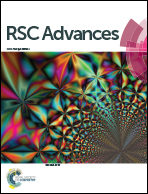Self-healing of abrasion damage on epoxy resin controlled by ionic liquid†
Abstract
A conventional epoxy resin thermoset has been modified with ionic liquid concentrations from 7 to 12 wt% to obtain softer, more ductile materials with self-healing ability for surface abrasion damage. The ionic liquid accelerates the initial stage of the epoxy resin curing process and reduces the glass transition temperature. Hardness values decrease with increasing ionic liquid content. Dynamic mechanical analysis shows that the addition of ionic liquid induces a reduction in storage modulus onset and maximum loss modulus values, and a displacement of the tan delta maximum values to lower temperatures with respect to neat epoxy resin. Although the instantaneous abrasion resistance under multiple scratching is lower for the epoxy resin–ionic liquid composites due to their lower hardness, the viscoelastic recovery and healing ability of the damaged surface with time shows that the self-healing ability increases with increasing ionic liquid content. The proposed mechanism is based upon the interactions between epoxy networks and ionic liquid molecules.


 Please wait while we load your content...
Please wait while we load your content...